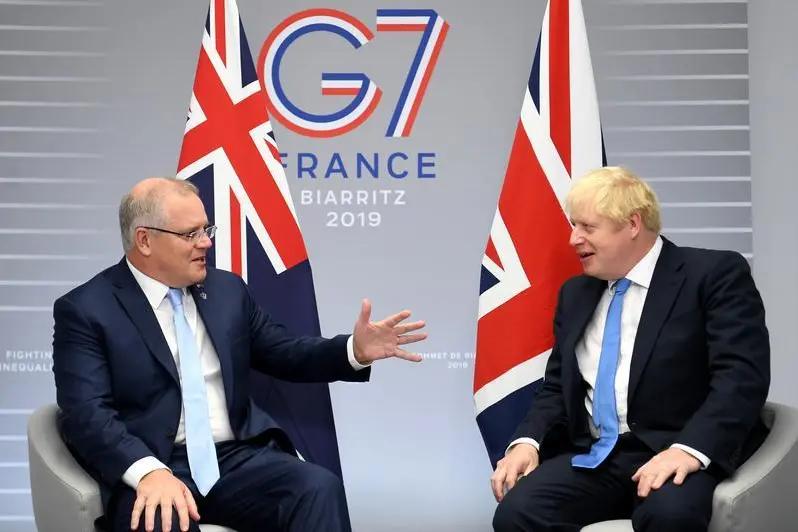PHOTO
(The author is a Reuters Breakingviews columnist. The opinions expressed are his own.)
LONDON - Britain’s trade talks with Australia are exposing some of the difficult tradeoffs the country faces after leaving the European Union. Cutting tariffs with its former colony would bring only a little more growth, cost UK farm jobs, and set a challenging benchmark for negotiations with others.
A trade deal would be a tweak rather than a revolution. The United Kingdom and Australia already do a lot of commerce despite the absence of a bilateral agreement. Britain mostly ships cars, drugs and clothing, and imports metals and booze. UK exports Down Under were just over 12 billion pounds in 2019, nearly three times the level in 2000.
Lowering tariffs further could bring benefits, though. Australia would be able to export more cheap meat to British consumers. In return, Canberra might lift barriers to UK financial services. Yet the payoff is negligible: the UK government reckons slashing tariffs to zero and cutting non-tariff barriers in half would only boost Britain’s GDP by 0.02%. The real upside is political: the UK would show it can cut trade deals quickly now that it has left the European Union.
The snag is that there are some very clear losers. Australia’s larger, more efficient farms would undercut British ones, leading to a net loss in UK farming jobs. That would hit rural areas, which the government has pledged to support, as well as Northern Ireland.
Prime Minister Boris Johnson could probably manage those costs. His government can stagger reductions in tariffs, support other kinds of farming, or pay to retrain agricultural workers. The problem is that Johnson has so far been reluctant to acknowledge Brexit tradeoffs. He’s bound to disappoint some supporters.
The bigger issue is how an Australian deal affects potential trade agreements with bigger countries. It could help Britain to join the CPTPP Asian trading block, boosting Johnson’s claim to be a champion of global free trade. But countries like the United States and Brazil would demand similar terms, with a bigger impact on UK jobs.
Johnson has little choice, though. He needs to show he can negotiate fresh trade deals. His best hope may be to cut a quick deal with Australia, followed by a broader Asian agreement, even if that means forsaking accords with the United States.
CONTEXT NEWS
- UK Prime Minister Boris Johnson is keen to offer Australia tariff-free access to British food markets, the Times reported on May 18.
- The United Kingdom and Australia are currently negotiating a free trade agreement, the UK’s first such standalone deal since it left the European Union.
- The National Farmers’ Union on May 17 called on the government to support the agricultural sector, including by setting quotas and safeguard clauses into any Australian trade deal.
- The UK and Australian governments said on April 23 that they had agreed on the “vast majority” of the elements of a free trade deal, and hoped to finish it by June.
- A trade deal with Australia could boost UK GDP by up to 0.02% in the long run, assuming a complete liberalisation of tariffs and a 50% reduction in non-tariff measures, according to a British government report published in June 2020.
(The author is a Reuters Breakingviews columnist. The opinions expressed are his own.)
(SIGN UP FOR BREAKINGVIEWS EMAIL ALERTS http://bit.ly/BVsubscribe | Editing by Peter Thal Larsen and Oliver Taslic) ((neil.unmack@thomsonreuters.com; Reuters Messaging: neil.unmack.thomsonreuters.com@reuters.net))





















